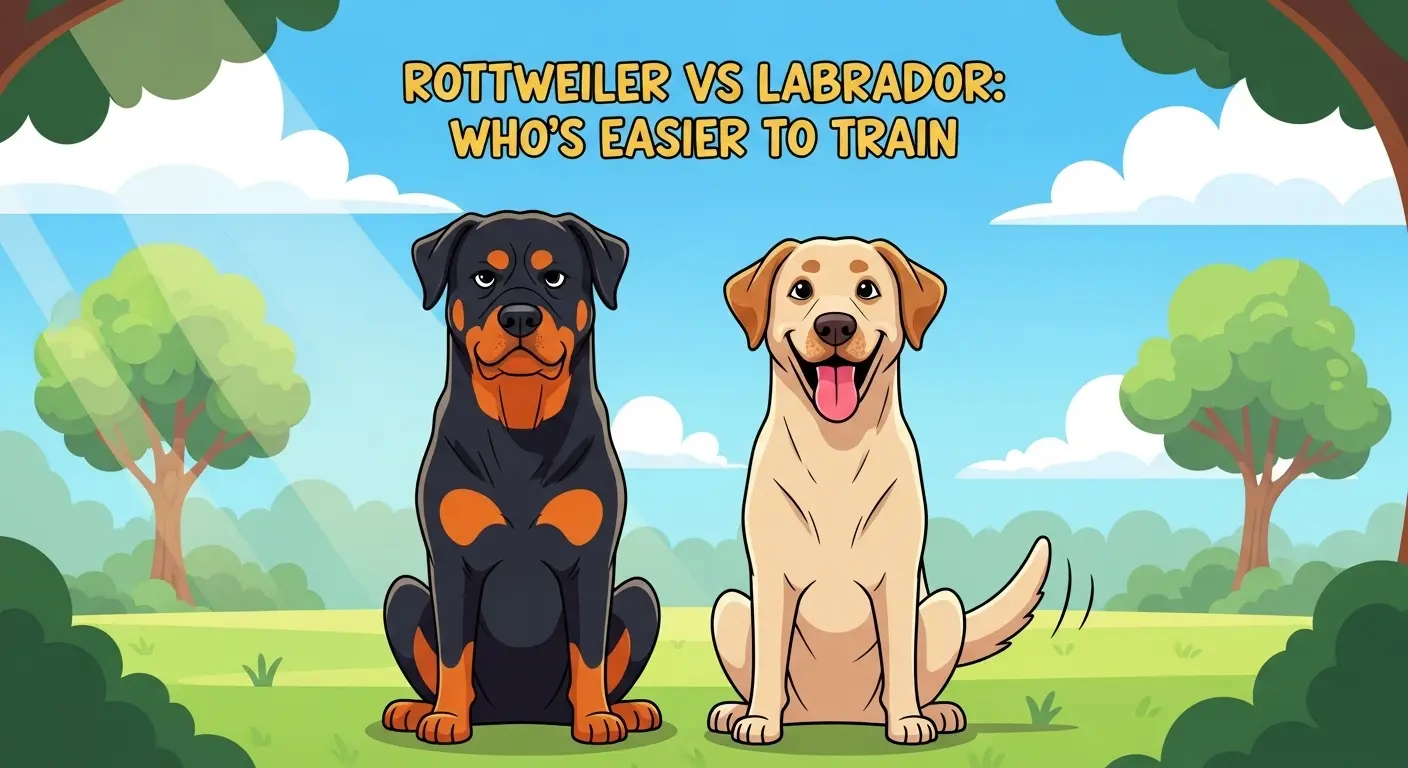If you’ve ever tried teaching a dog to “sit” while it stares blankly at you like you’re speaking ancient Greek, you know training isn’t always a walk in the park.
Some dogs pick things up faster than you can say “good boy,” while others act like obedience school is optional.
So, between Rottweilers and Labradors, who’s the real teacher’s pet? Let’s break it down in plain English (with a little honesty, sarcasm, and dog-lover wisdom sprinkled in).
Temperament: The Foundation of Trainability

Before we jump into commands and tricks, let’s talk temperament because training starts with personality.
Rottweiler: The Serious Student
Rottweilers are like that one student who’s super smart but doesn’t trust the teacher right away. They’re confident, intelligent, and fiercely loyal, but they won’t follow orders just because you said so. You have to earn their respect first.
They respond well to consistent rules and calm authority, not shouting or harsh discipline. Once you’ve built that bond, though? They’ll move mountains for you (or at least fetch the heavy stuff).
Still, a Rottweiler’s protective streak can make early socialization crucial. Without it, they might treat the mailman like an intruder rather than a friendly visitor not ideal if you like getting your Amazon packages on time.
Labrador: The People-Pleaser
Now, Labradors? Total teacher’s pets. These dogs live for approval. They’re like, “You said sit? I sat! Treat now?”
Labs are gentle, eager to please, and endlessly patient, which makes them one of the most trainable breeds in the world. That’s why you see them as service dogs, therapy companions, and guide dogs basically, the overachievers of the canine world.
Their friendliness can sometimes backfire, though. They’ll obey you 99% of the time unless there’s a squirrel, a snack, or literally any distraction.
Verdict: Labradors win this round for sheer eagerness and easygoing nature. Rottweilers need more structure, but they’ll ace the test once they trust you.
Intelligence: Both Brains, Different Styles
Here’s the twist both breeds are crazy smart, but their intelligence shows up differently.
Rottweiler Intelligence
Rottweilers are problem-solvers. They think before acting, which sounds great until they start testing your authority. You’ll see it in their eyes that “Hmm, do I really have to do this?” look.
They learn commands fast but may not follow them blindly. It’s not defiance; it’s logic. They’re like, “Explain why this is necessary, human.”
That’s why consistent training, patience, and a firm hand matter. If you slack off, they’ll notice and start making their own rules.
Labrador Intelligence
Labs are all about obedience and repetition. Tell them “sit” a few times, and they’ll do it forever (even when you didn’t ask). Their memory and enthusiasm make them ideal for families or first-time dog owners.
They thrive on praise and treats. Give them a snack, and they’ll follow you into battle or at least through a 10-minute training session.
Verdict: It’s a tie, but it depends on what you value. Rottweilers are strategic thinkers, while Labradors are obedient learners.
Training Difficulty: The Honest Truth

Okay, let’s cut through the fluff Labradors are easier to train, hands down. But don’t count the Rottie out just yet.
Training a Rottweiler
Training a Rottweiler is like coaching a professional athlete you need discipline, patience, and respect. They’re driven, loyal, and love having a job to do.
Use positive reinforcement (treats, praise, toys), and they’ll shine. Use harsh tones or punishment, and you’ll lose their trust. Consistency is key. Miss one rule, and they’ll test every boundary from that day forward.
Common Rottie training goals:
- Basic commands: Sit, stay, come all doable with consistency.
- Socialization: Early and frequent.
- Guard training: Only under expert supervision, not backyard DIY stuff.
If you’re a first-time dog owner, a Rottweiler might overwhelm you. They need someone confident, not controlling.
Training a Labrador
Training a Labrador feels like working with your favorite coworker cooperative, cheerful, and maybe a little too into snacks.
Labs respond beautifully to praise and repetition. They love structure but also love fun, so mixing obedience with playtime works wonders.
Common Lab training goals:
- Obedience training: They usually nail it by 6 months.
- Leash manners: A must, since Labs tend to drag you toward excitement.
- Impulse control: Especially around food (they’re professional beggars).
Even kids can help train a Lab, which makes them a family favorite.
Verdict: Labradors are easier for beginners. Rottweilers require experience and consistency.
Motivation and Rewards: What Makes Each Dog Tick
Ever notice how some dogs would sell their souls for a biscuit while others need emotional validation? Yeah, that’s what we’re talking about.
What Motivates a Rottweiler
Rottweilers love respect, routine, and purpose. They like feeling useful. Tasks like protection drills, obedience challenges, or agility work feed their drive.
Treats work too, but only if paired with clear structure. They’re not food-obsessed like Labs, so you’ll need to mix up rewards verbal praise, playtime, and challenges all count.
What Motivates a Labrador
Labradors? One word: food. You could train a Lab to file your taxes if you had enough treats.
They’re suckers for snacks, praise, and affection. Keep sessions short and fun, and they’ll keep wagging through every “sit,” “stay,” and “roll over.”
Just watch the calories Labs can pack on pounds faster than you can say “chubby buddy.”
Verdict: Rottweilers work for respect; Labradors work for snacks. You decide which sounds easier. 😉
Socialization: The Secret Ingredient
Training doesn’t happen in a bubble. How each dog interacts with people and other animals can make or break their progress.
Rottweilers and Socialization
Rotties need early, frequent social exposure. Without it, their protective instincts can turn into over-defensiveness.
Introduce them to friendly dogs, new environments, and strangers early on. Keep things calm and positive. A well-socialized Rottweiler is confident, composed, and a total sweetheart (even if he still gives strangers “the look”).
Labradors and Socialization
Labradors basically come pre-socialized. They’ll wag their tails at everyone the vet, the mailman, the burglar (kidding… kinda).
Still, early socialization helps fine-tune their manners. Teach them not to jump, bark excessively, or over-greet people.
Verdict: Labradors are naturally social; Rottweilers need more structured exposure.
Mistakes Owners Make (and How to Avoid Them)
Training fails usually come down to human error, not dog stubbornness. Here’s what to watch out for:
Common Rottweiler Owner Mistakes
- Being inconsistent. If you let them get away with one thing, they’ll remember.
- Skipping early training. A Rottie without structure becomes self-appointed “boss.”
- Using harsh corrections. They respond to calm leadership, not yelling.
Common Labrador Owner Mistakes
- Spoiling with food. Labs gain weight fast. Keep treats small and occasional.
- Ignoring mental exercise. Smart dogs get bored and destructive without stimulation.
- Letting them jump. Cute as a puppy, annoying as a 70-pound adult.
Pro Tip: Both breeds thrive on routine, positive reinforcement, and short, daily sessions. Consistency beats intensity every time.
Which Breed Learns Faster?
Alright, let’s settle this. When it comes to learning speed, Labradors are faster by a mile.
Why? Because they love to please. Labs crave human attention and approval, so they’ll repeat commands endlessly just to make you happy.
Rottweilers are just as capable but more selective. They’ll learn quickly when they see the point. Think of it like this:
- Labrador: “You said fetch? Done!”
- Rottweiler: “Why fetch when I could guard the stick instead?”
Both approaches work but one’s definitely easier on the patience.
Who Should Train Which Breed?

Here’s where lifestyle and personality come in.
Rottweilers Are Better For…
- Experienced owners who understand dog psychology.
- People who value discipline and structure.
- Those wanting a loyal protector and working partner.
Labradors Are Better For…
- Families, beginners, or anyone new to dog ownership.
- People with active lifestyles who love outdoor fun.
- Folks who want an affectionate, easygoing companion.
If you love a challenge and have time to invest, the Rottweiler will impress you. But if you want an enthusiastic buddy who practically trains himself go Lab every time.
Final Verdict: Which Breed Is Easier to Train?
If you’ve made it this far, you probably already know the answer Labrador Retrievers take the crown for ease of training.
They’re born people-pleasers, love learning, and rarely push back. Rottweilers, on the other hand, are brilliant but demand respect and experience.
Here’s a quick summary:
| Category | Rottweiler | Labrador |
|---|---|---|
| Trainability | High (with experienced owner) | Very High (great for beginners) |
| Motivation | Respect, structure | Food, praise |
| Social Nature | Protective and reserved | Friendly and outgoing |
| Learning Speed | Fast (once engaged) | Very fast |
| Ideal For | Experienced owners | Families and first-timers |
At the end of the day, both breeds will give you loyalty, love, and endless memories. It just depends on how much patience and structure you’re ready to put in.
So… which one’s for you? The disciplined bodyguard or the happy-go-lucky family clown? Either way, you’re getting one amazing dog as long as you’re ready to be the kind of human they deserve. 🙂
FYI: Whichever breed you choose, training isn’t a one-time thing. It’s a journey. Stay consistent, keep it fun, and remember even the smartest dogs have “I forgot” days (don’t we all?).
